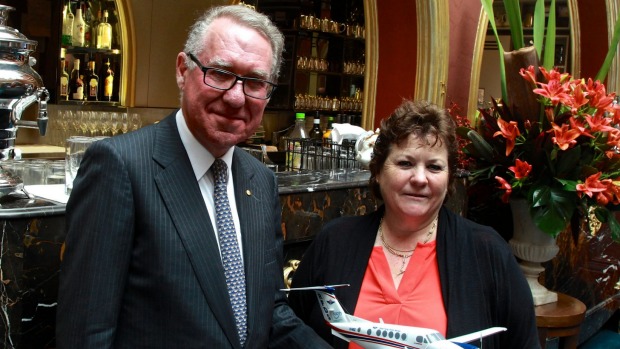
David Gonski and Dr Lyn Mayne at the first of a series of Philanthropy Breakfasts in Sydney on Tuesday. Photo: Ben Rushton
When the Royal Flying Doctor pilot dental program TOOTH first touched down in NSW’s west three years ago, only seven out of 220 children at Bourke Public School had healthy teeth that didn’t require more treatment.
The Royal Flying Doctor Service is usually associated with medical emergencies and evacuations, but since 2012 its new dental program has flown into outback NSW. Twice or once a week, a dentist and dental therapist have operated out of small offices in four remote towns – Bourke, Collarenebri, Goodooga and Lightning Ridge.

David Gonski was the special guest speaker at the first of a new series of Philanthropy Breakfasts in Sydney on Tuesday. Photo: Ben Rushton
When the service began, most children’s oral health was that of a developing nation, said one of the first dentists working on the program. Very few children or adults had seen a dentist before. Most children had an average of five decayed teeth, nearly five times the average rate.
Now a $2.5 million pilot program, which included $1.4 million funding from the Gonski and Investech Foundations, is nearly over, and is looking to federal and state governments to contribute so TOOTH (The Outback Oral Treatment and Health) could be continued and expanded.
Since it started, it had treated nearly 5000 patients, provided 695 clinics in these towns and provided more than $1 million in care. As a result, the rate of rotten teeth in children has halved, and fillings have increased. Both children and adults were returning to the dentist for more care, indicating improved awareness of the need for ongoing and preventive dental care.
Philanthropist and businessman David Gonski said the program had proven that it worked, eliminating the risk for government. “What we’ve done, we have proven that it works. That’s the job of the philanthropist,” he said.
Mr Gonski said the next phase could be supported by a mix of philanthropic, NGO, corporate and government funding. Holding a model of a Royal Flying Doctor plane that he was given on Tuesday morning as thanks for his gift, he said it could “easily display the names of those with dental products”.
Originally Mr Gonski and his family had planned to fund a program to reduce the incidence of skin disease in children in remote areas. But after a visit four years ago, he was quickly convinced the need to improve oral health in the Indigenous and non-Indigenous community was greater.
“We saw a lot of dental chairs but no dentists,” he said of the towns where the service now operates. Some were shiny and brand new, and had never been assembled.
Locals said they had to drive five hours to see a dentist. Mr Gonski even recalled a young boy whose gums were bright red from disease.
Calling on other businesspeople to give more, he said the “joy of giving was an enormous thing”. Through philanthropy, his world had widened and he had met people and seen things he would never have encountered. He also called on other business leaders to give as much thought to how they gave as to how they made their money.
“Many wealthy people have spent hours, days, meticulously thinking about how to make their money, and often give it away without any thought whatsoever. Without any KPIs (key performance indicators) or without expectations of great changes,” he said.
Mr Gonski said the giving was as important as the making of the money. “That means non-profits have to work harder, and the giver has to be more precise about what they want to achieve.”
He once gave money to a wonderful cause overseas only to find it didn’t happen.
“But it took me four years to realise that,” he said.
